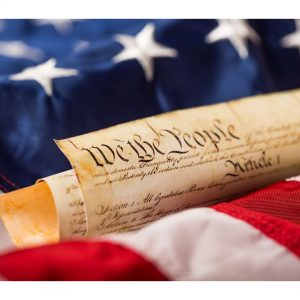
The Importance of Teaching History in Homeschool
July 28, 2023Post Sponsored by American Heritage Education Foundation
Studies in the last 20 years point to a growing problem in America that can no longer be ignored. The problem is that many Americans from all backgrounds do not possess adequate knowledge about our nation’s history, founding ideas, and governing institutions. This widespread deficiency among the general public is a serious matter in a self-governing republic such as ours, which relies on an educated citizenry to govern itself. If these trends continue, as many historians and practitioners note, America will not be able to endure as it was designed by our Founders. Consider the findings of the following studies within the past 20 years.
A Timeline of Evidence
- In 2003, a report commissioned by the Carnegie Corporation and the Center for Information & Research on Civic Learning & Engagement (CIRCLE) on The Civic Mission of Schools warned that “school-based civic education is in decline” and “young people’s political and civic knowledge is inadequate.” It observed that in recent decades increasing numbers of Americans have disengaged from civic and political institutions. Young people reflect these trends:
- They are less interested in public affairs
- They are less likely to vote
- They are less likely to discuss political and public issues than older groups or past generations of young people.
- There are also “gaps in young people’s knowledge of democratic principles and processes.” As a result, many young Americans are not prepared to fully participate in our democracy.
- In 2004, a study by the Education Commission of the States (ECS) noted that only 23 states had testing or assessments for civics or government.
- In 2005, the American Bar Association conducted an opinion poll on Civics Education which revealed the general public’s lack of knowledge and understanding of civics, government, history, and law. The study showed that 45% or nearly half of Americans could not identify the three branches of government.
- In 2005, Findlaw.com conducted a U. S. Supreme Court Awareness Survey that showed that 57%, more than half, of Americans could not name one current judge sitting on the U. S. Supreme Court.
- In 2006, the National Center for Education Statistics administered the National Assessment of Educational Progress (NAEP), known as the Nation’s Report Card, in civics. It showed that only about one-quarter of students in grades 4, 8, & 12 were proficient in civics.
- In 2006 and 2007, the Intercollegiate Studies Institute (ISI) found in its respective studies The Coming Crisis of Citizenship and Failing Our Students, Failing America that most graduating college seniors failed a basic civic literacy test on America’s history and institutions.
- In 2007, a study commissioned by the Center for Information & Research on Civic Learning & Engagement (CIRCLE) warned of a growing “civic achievement gap” among ethnic and socio-economic groups. Non-white, poor, and/or immigrant youth demonstrate less civic and political knowledge, skills, positive attitudes, and participation than white and wealthier groups. The former face “serious political disadvantages.”
- In 2008, the Intercollegiate Studies Institute (ISI) found in its study Our Fading Heritage that 71% of Americans of all backgrounds, incomes, and education failed a basic civic literacy test. Only 27% knew that the Bill of Rights prohibits the establishment of an official religion in the United States.

- In 2008, the Bradley Foundation conducted a study called E Pluribus Unum to assess America’s national identity. It found that though most Americans believe we share a unique national identity, more than half believe this identity is weakening. The study points out that “the next generation of Americans will know less than their parents know about our history and founding ideals. And many Americans are more aware of what divides us than of what unites us. We are in danger of becoming not ‘From Many, One’–E Pluribus Unum–but its opposite, ‘From One, Many.’”
- In 2010, the National Center for Education Statistics conducted its National Assessment of Educational Progress (NAEP), or Nation’s Report Card, in Civics and U. S. History. Less than one-quarter of students in grades 4, 8, & 12 performed at or above a proficient level in history. Its findings continue to indicate a need for civic and history education among K-12 students.
- In 2011, the National Association of Scholars (NAS) conducted a study called The Vanishing West: 1964-2010: The Disappearance of Western Civilization From the American Undergraduate Curriculum. The study traces “the decline and near extinction of the Western Civilization history survey course in America’s top colleges and universities from 1964 to 2010.”
- In 2012, the Educational Testing Service (ETS) conducted a study called Fault Lines in Our Democracy that revealed a lack of civic knowledge among K-12 students.
- In 2013, the National Association of Scholars (NAS) conducted a study called Recasting History: Are Race, Class, and Gender Dominating American History?. The study found that many college history courses emphasize race, class, and gender social history so strongly that they significantly reduce coverage of other important U. S. history subjects–like the nation’s military, diplomatic, intellectual, and religious history. As a result, students often get “a less-than-comprehensive picture of U. S. history.”
- In 2014, the Stanford Center on Adolescence and the University of Washington Center for Multicultural Education conducted a study called Youth Civic Development & Education: A Conference Consensus Report. The report concluded that “it is essential for schools to play a role in sustaining and promoting our democratic system” but that “schools do not devote sufficient time and effort to civic education; nor is this mandate high on the priority lists of influential policy makers. The civic goal of education is being left unfulfilled and even ignored by many of our schools.”
- In 2014, the National Assessment Governing Board and National Center for Education Statistics conducted its National Assessment of Educational Progress (NAEP), or Nation’s Report Card, in U. S. History, Geography, and Civics. The report showed that only 18% of 8th-grade students are proficient in U. S. History, 27% are proficient in Geography, and 23% are proficient in Civics. Its findings indicate a continuing, great need for civic and history education among K-12 students.
- In 2016, the American Council of Trustees and Alumni (ACTA) released a report titled A Crisis in Civic Education which stated that schools, colleges, and universities “have done a poor job of ensuring the civic literacy on which our nation depends.” It found that “many institutions fail to require courses that ensure civic knowledge and often allow community service projects, well-intentioned as they are, to substitute for deep learning about our nation’s institutions of government and their history.”
- In 2017, the National Association of Scholars (NAS) conducted a study called Making Citizens: How American Universities Teach Civics. The study found that a new movement in American higher education aims to transform the teaching of civics to make students supporters of the New Left’s goal to “fundamentally transform” America. It observed that “instead of teaching college students the foundations of law, liberty, and self-government, colleges teach students how to organize protests, occupy buildings, and stage demonstrations”—forms of engagement that are “far from being a genuine substitute for learning how to be a full participant in our republic.” The study concluded that “traditional civic literacy is in deep decay in America” and that the New Civics movement of progressive activism has “taken over civics education” and “aims to take over the entire university.”

- In 2017, a Tufts University research paper presented at the Democracy at a Crossroads National Summit, titled The Republic is (Still) at Risk—and Civics is Part of the Solution, showed that Americans lack confidence in our political system. Mistrust of the federal government has persisted across several administrations. 1 in 5 Americans trusts the government most of the time. Americans have also lost trust in fellow citizens’ ability to capably govern the republic. Just 33% say they have a “good deal of confidence in the wisdom of the American people when it comes to making political decisions.” The result of such distrust is declining support for democracy. The report asserts that civic learning is “an essential part of the solution” and “the best vehicle to train young people to sustain our democracy.” Evidence shows that civic learning can raise young people’s knowledge, skills, and dispositions supportive of a republican form of government.
- In 2018, the National Assessment of Educational Progress (NAEP) conducted a civics assessment, the Nation’s Report Card in Civics, of approx. 13,400 8th-grade students to measure their “civics knowledge and skills that are critical to the responsibilities of citizenship.” Only 24% of students performed at or above proficiency.
- In 2020, the Texas Public Policy Foundation (TPPF) examined the origins, nature, and effects of “action civics” as a means of civic education in a qualitative study titled Action Civics, New Civics, Civic Engagement, and Project-Based Civics: Advances in Civic Education? The study found some merit in action civics or experience-based learning but concluded that it “placed too much stress on participation and too little on the acquisition of the knowledge of the fundamental political, philosophical, and moral principles undergirding the Constitution.”
- In 2020, the Concord Law School issued a report detailing how American civic education has fallen victim to competing priorities in U. S. classrooms. The report found that K-12 teachers are required to focus on math and reading skills to prepare students for standardized testing, college, and beyond which leave little time to devote to civics and government. Only nine states and the District of Columbia require 1 year of civics or government education for high school graduation—31 states require a half year and 10 states have no requirement.
- In 2021, The Ethics and Public Policy Center published a report documenting advocates of ‘Action Civics’ pressing the novel practice of mandating that ‘Action Civics’ that will politicize an already tainted K-12 educational system irrevocably cementing the partisan Left’s hold on our culture. ‘Action Civics’ amounts to school-sponsored indoctrination and political action in support of progressive policy positions.
- In 2022, the Carnegie Commission on Higher Education found that only 12% of university professors were ‘conservative’. Other recent studies determine that conservatives make up less than 5% of historians, sociologists, and literature professors at American colleges and universities. The Center for the Study of Partisanship and Ideology revealed that one in three conservative graduate students and faculty had been threatened with disciplinary action for expressing their views, conservative events had been canceled and campus police have physically prevented conservatives from taking the stage.
The Importance of Learning History
Without citizens’ learning of America’s founding principles and history, America as we know it cannot survive. If Americans are ignorant of America’s heritage, our nation cannot endure as it was originally designed by the American Founders. America’s heritage is at risk in our society, culture, institutions, and education today.
Various political, educational, intellectual, media-informational, immigrational, socio-economic, and cultural influences have likely contributed to the nation’s civic deficiency, but one solution seems obvious. Students and citizens, in every generation, need effective doses of civic education throughout their school years and beyond. Americans of all ages must commit to learning, with increasing competency, about America’s founding history and philosophy—about America’s values and ideals. We must know and apply the rights and responsibilities of citizenship. What is more, we must pass this knowledge and these values on to others and to the next generation. Civic learning, participation, and education should continue throughout our adult lives. This commitment is the responsibility of every American.
The American Heritage Education Foundation (AHEF)—a non-profit, non-partisan organization in Houston, TX—works to address this growing national educational problem. AHEF is dedicated to promoting the teaching and learning of America’s factual, philosophical heritage, emphasizing themes of freedom, unity, progress, and responsibility. AHEF offers educational resources to help teachers and citizens learn and effectively teach about America’s founding documents, principles, and history. For more information, visit www.americanheritage.org
Additional Homeschool Resources
The American Heritage Education Foundation website
PODCAST: Civics and Government
The Importance of Discovering Lost History
Latest Posts

As homeschooling continues to grow in popularity, more parents are taking on the challenge of providing a comprehensive education that not only meets academic standards but also prepares their…
Read more >
June has come and gone, and summer is in full swing! Whether you're traveling this summer or staying close to home, we hope you're enjoying this time with your family. We wanted this month's…
Read more >
Summer is an all-around favorite season for most people. In the U.S., it’s even more exciting for many of us since we get to celebrate Independence Day! The Fourth of July is a wonderful…
Read more >

